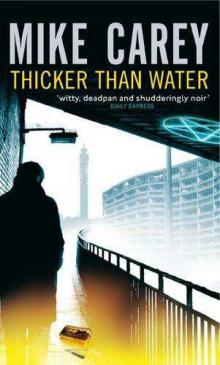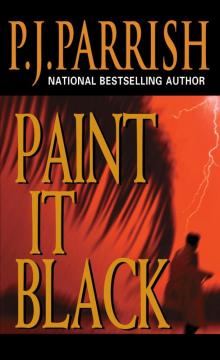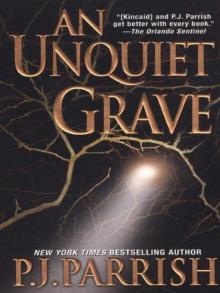- Home
- P J Parrish
A Killing Rain Page 8
A Killing Rain Read online
Page 8
“Some people were killed,” she said.
“Yes, I know. I’m helping the police find out who did it.”
She tilted her head, as if looking at him in a new light. “Do you live around here?” Louis asked.
“Yes, around the corner,” she said, pointing.
“Did you see anything strange here yesterday? Anything at all?”
She shook her head. “I was in school. But Grandpa was here,” she said. “He is always here. He comes here every morning to drink his coffee and read La Verdad.”
Louis looked at the old man, who was just staring straight ahead, his eyes hidden behind the dark glasses.
“Can he see okay?” Louis asked the girl.
“Oh, sure. He had cataract surgery last year.”
Louis turned and roughly aligned himself with the old man’s sight line. The old man had a direct bead on the lot, stairway, and front door of Pacific Imports.
“Could you ask him some questions for me?” Louis asked the girl.
She hesitated. “I don’t think he will answer.”
“Why not?”
She fidgeted in her seat. “He doesn’t like black people.”
Louis’s eyes went to the old man’s face. But he was still staring straight ahead, mouth set in a hard line.
“Could you try, please?” he asked the girl.
“Maybe he will talk to you if I tell him you are a policeman.”
Louis hesitated. “Okay.”
She spoke softly to her grandfather. The old man still would not look at Louis, but at least his grip on the cane lessened some.
“Okay,” the girl said. “What do you want to know?”
“Ask him if he saw anything strange yesterday.”
The girl touched the old man’s arm. “Abuelo, vistes algo raro ayer?”
“Ese negro esta muerto,” he spat out. “Se lo merecia!”
The girl glanced at Louis then back at her grandfather. She began to speak to him softly but firmly. The old man listened and then began to speak again, pointing toward Pacific Imports. The girl leaned close to listen then looked up at Louis.
“He said there is usually only one black man who works up there, but a couple days ago, another black man came.”
“What day was that?”
She asked him and looked back at Louis. “The other man came here on Monday in a black BMW.”
“He’s sure it was a black BMW?” Louis asked.
The girl nodded. “Grandpa loves cars. He is sure. He says he saw the second black man leave the next day. He had a suitcase in the trunk. He didn’t come back.”
“How does he know?”
The girl shrugged. “Grandpa sits here all day. He doesn’t like to be home because my baby brother cries a lot.”
Louis ran a hand over his face. That meant Austin made an appearance at his office five days ago, left for Fort Myers a day later, and hadn’t been seen back here since.
“Ask him if he ever saw a boy with the man,” Louis said. “A black boy.”
The girl translated and turned back. “No, just the two men.”
“Ask him if he saw anyone go in who looked...” Louis hesitated. “Who looked strange.”
The girl frowned and spoke in Spanish again to her grandfather.
“He saw...” she sighed. “He says he saw dos Yankis —- two white men —- go up there yesterday after lunch. Someone shut the blinds and then soon after, the white men came back out.”
“Why did your grandfather think that was strange?”
“They were wearing gloves.”
“Gloves? It’s cold. Lots of people are wearing gloves.”
“Yes,” the girl said, “but Grandpa says the men put on their gloves before they went into the office.”
Louis hesitated, wondering where to go next. “Is there anything else?” he asked. “Can he remember what kind of car they had?”
She asked and turned back to Louis. “He says it was a big, old blue Cadillac, with dark windows, you know, tinted? He says it looked like a car a drug dealer would drive.”
“Anything else? Anything at all?” Louis asked the girl.
She spoke again to her grandfather. She looked up at Louis and shook her head. “No, I’m sorry.”
The old man started speaking again, pointing toward the parking lot across the street. He seemed to be upset about something.
The girl looked contrite when she looked back at Louis. “I’m sorry,” she said. “He gets mad sometimes about things. Men broke into our home and stole some things once and now we have bars on the windows. Grandpa isn’t mad at you. He’s just mad at everyone.”
The old man said something under his breath, pointing again at the lot. Louis heard the word Yankis again.
“What did he say?” Louis asked.
“He says he thought the Yankis had come to steal that car over there.”
Louis looked to where the girl was pointing. There was one car in the lot of Pacific Imports beside the two police cruisers. It was an old Chevy Bel Air, red and black, and restored to its pristine 1953 condition.
The old man was talking again, but his tone had changed. He was pointing toward the old car, speaking softly, reverently.
“Grandpa said he had a car like that back in Cuba, only his was blue,” the girl told Louis.
The old man muttered something.
“What?” Louis asked the girl.
She blushed. “He called the man a bad word. He said he hated seeing him touch that beautiful car.”
Louis’s eyes shot back to the Chevy. Fingerprints? Damn, could they get that lucky? He turned back to the girl.
“Thank you very much,” he said. “And thank your grandfather for me.”
This time the girl smiled.
Louis jogged back across the street, stopping at the tape that stretched across the lot. He was considering approaching the two uniforms when he saw Joe’s red Bronco pull up. She got out and came toward him, her shoulders hunched in the leather jacket, her hands stuffed in the pockets of her black jeans. She was wearing huge tortoise-shell sunglasses that covered a good part of her face. Her hair was back in its ponytail.
“Sorry I’m late,” she said. “I was over at the station getting an update.”
“No word on Austin Outlaw, I take it?” Louis asked.
“No, but we checked all the flights out of MIA last night and he wasn’t on any of them. Checked Fort Lauderdale, too, just in case. Nothing. The BMW was due to be turned in to Avis last night. No sign of it. So, you find anything?”
“Would you believe fingerprints?”
She stared at him. “Prints? Where?”
Louis nodded toward the cafe across the street “Some old guy over there saw two guys go up to Pacific Imports.” Louis pointed to the Bel Air. “And before they went up, one of them was looking in that car over there.”
“Damn,” Joe said softly. “Can we get that lucky?”
“I don’t think the car has been moved,” Louis said. “It has a For Sale sign in the window.”
A faint smile tipped Joe’s lips and she ducked under the yellow tape. Louis followed.
One of the uniforms was leaning against the back fender of the Bel Air.
“Harvey, move your ass,” Joe said.
The cop looked up at her. “Why? Nothing going on down here, detective.”
“No, I mean, move your ass off the car. We need to dust it.”
The officer straightened, looking at the Chevy. Louis waited as Joe filled him in then she went upstairs to the Pacific Imports office. She spoke for a moment with a guy in a brown sports coat, who looked down at Louis. Louis recognized him as the detective he had approached on the first day, the one who had told him to go back home to Captiva. The guy looked like he was giving Joe a hard time.
After a moment, the detective went back inside the office and a crime unit tech came out. Joe led the tech down to the Chevy and then she came back to Louis.
“The old man said he
saw their car,” Louis told her. “It was an old blue Cadillac, big, with dark tinted windows.”
Joe nodded in approval. “We’ll put out an APB for it. Good work. It’s hard to get people around here to talk sometimes.”
“I think it was the Dawg sweatshirt,” Louis said.
“What?”
“Nothing.” Louis was quiet, looking up at the windows of Pacific Imports. The detective in the brown sports coat was standing outside, staring down at them.
“I hope I didn’t cause you any problems here,” Louis said.
“Problems?” Joe asked.
“With that detective,” Louis said, nodding upward.
“Who? Kemper? Don’t worry about him.”
“Well, I know how cops can be. They don’t like outsiders interfering with their case.”
“Well, it’s not his case now. It’s mine.”
Louis couldn’t hide his surprise. Joe gave him a half-smile.
“I know what you’re thinking —- how the hell did she get this big juicy case?” she said. She was watching the tech starting in on the Chevy Bel Air. “Things are different here,” she said. “Guys like Kemper don’t care much about Eighth Street or little dead black boys.”
She let out a sigh and then looked back at Louis. “I could use a caffeine fix. Come on, I’ll buy you a cafecito.”
Louis glanced quickly at his watch. He had managed to ignore the guilt he was feeling about being away from Susan. He had been able to justify staying in Miami by reasoning that maybe Austin and Benjamin were still here. But his gut was telling him that Austin had never left Fort Myers. And that was where he needed to be right now.
“I can’t,” Louis said. “I really need to get back to Fort Myers.”
Joe hesitated, then nodded. “Yeah, okay, I understand. But I need a favor before you leave.”
“Sure. Anything”
“I need you to come to the office and fill out a statement for me,” Joe said. She paused just a beat. “Come on. You can call the mother from there.”
CHAPTER 10
The City of Miami Police Department was housed in a large modern building in Overtown, a neighborhood of gray municipal buildings and rundown apartments the colors of a heat-bleached sunset.
In the distance, Louis could see the gleaming high rises of Biscayne Boulevard and the steel skeleton of a new basketball arena going up. After the close smells and sights of Little Havana, this area had an oddly desolate feeling to it. A chain-link fence surrounding a vacant weed-choked lot. Wide streets with no people though it was high noon. And above, a monorail whispering by, its sleek cars empty. It felt like a city in some sci-fi movie where a mutant bug wipes out the population but leaves everything running.
Louis followed Joe into the spacious lobby. All the signs were in English and Spanish. The uniform behind the large circular information desk gave Joe a nod as she led Louis past.
They took the elevator to the second floor, and Louis followed Joe through a door that said CRIMES AGAINST PERSONS UNIT. He had been looking for something that said HOMICIDE.
His first impression was noise: the warbles and rings of phones, the banging of metal file drawers, a hacking cough, a low laugh. Then sight: gray metal desks, towers of paper, flickering green computer screens under the mean glare of florescent. And finally, smell: cigarettes, greasy take-out chicken, and a faint odor of sweat.
Joe got pulled aside into a discussion with another detective. Louis stood at the door, transfixed.
So this is it.
His eyes focused on a white erasable board that covered an entire wall. He knew it was the homicide case board. Every station had one. He scanned the headings atop each column: Victim. Date. Location. Investigator. Status. Weapon. Motive. Suspects. ME. It was all there —- in black and red ink.
The board listed sixty-three open cases. The double-murder on Eighth Street was third to last. Two more since last night.
“Louis! Over here.”
Joe was beckoning from a desk in the corner. He went over to her, aware of the subtle shift of eyes following him. Joe was the only woman and he was the only black man, except for a guy dressed in an orange Dade County jumpsuit sitting at a desk giving a statement.
Her desk was near the windows. Through the streaked glass, he could see the cars whizzing by on I-95. Joe’s phone was ringing.
“Have a seat,” Joe said, grabbing the phone.
While he waited for her to finish the call, Louis scanned the room again, trying not to look like he was staring.
He had worn a badge before. He had worn a uniform, and had once, in his rookie year, even assisted a detective on a domestic shooting death. But that had been back in Ann Arbor, a small force in a college town where the four-by-four-foot homicide case board never filled up. After that, he had worked in even smaller departments, places that weren’t big enough to have case boards or make distinctions between plain tin badges and gold ones.
Louis’s eyes swept the room. Four, five, six. He could count six gold badges here right now. Seven...he had forgotten Joe.
Joe hung up the phone. “Okay, come on,” she said, “I want you to meet my boss.”
Louis followed Joe across the office. Some of the men looked up at Joe’s face, their eyes dropping to her ass as she passed. Then they glanced up at Louis curiously. He knew they thought he was a boyfriend or something. And he tried to decipher the look. Envious? Protective? Or disapproving?
At a corner office with the plate MAJOR ANDERSON on the door, Joe knocked then went in. The man behind the desk looked up. He was built like the bulldog on Louis’s sweatshirt, with a silver-blond brush cut and gray-green eyes in a ruddy, tanned face.
“Major, this is —-” Joe started.
“Louis Kincaid,” the man said, standing and extending his hand.
Louis shook it. “You know me?”
“I know of you.”
Louis glanced at Joe. She looked confused.
“I’m Major Anderson,” he said. “Kevin Anderson. Have a seat. It’s a pleasure to meet you.”
Anderson began to rifle through a stack of magazines on his credenza. “I just read about you a few weeks ago in Criminal Pursuits Magazine,” he said. “It was on the Paint It Black killer, the guy you caught a few years back.”
Louis could see Joe out of the corner of his eye but she was still just standing near the door, her arms crossed.
Anderson looked at her. “Joette, go grab us some coffee, would you?”
She didn’t move.
“Don’t give me that look. You’re closest.”
She disappeared.
Anderson finally gave up trying to find the magazine and sat down at his desk. “The article said you refused to be interviewed. How come?”
“I don’t like reporters,” Louis said.
“They can make or break your career,” Anderson said. “And making a name for yourself is the only way you’re going to make any money doing what you do. You’re only what? Twenty-five, twenty-six?”
“Twenty-eight,” Louis said. “And I do okay. I do better than okay.”
Joe came back and handed Louis a Styrofoam cup and some sugar packets. She set Anderson’s cup on his desk, then leaned against the door jamb.
Anderson was sitting back in his chair, just looking at Louis over the steeple of his fingers. Louis took a drink of coffee. It was awful but at least it was hot.
“The article said you used to be a cop,” Anderson said.
He needed to nip this in the bud; he wasn’t about to explain why he had quit and he had a feeling the article had pretty much told the whole story anyway.
“Major, I know how you guys feel about P.I.s —-”
Anderson stopped him with a raised hand. “Most of the guys. Not all. Not me, that’s for sure. I have no problem with you. I respect what you’ve done, and I hear the guys on the west coast think you’re okay, too. Hell, anyone who can put a serial killer and a goddamn slimy ass lawyer in jail is okay in my bo
ok.”
Louis glanced up at Joe. She took the cue and stepped forward. “Louis is here looking for a missing kid. The kid’s father is connected to one of the victims on Eighth Street.”
Anderson never looked at her. “Think your kid’s in Miami?”
“I did, but now I’m not so sure.”
“So you’re heading home?”
Louis nodded.
“Well, I’ll have Joette keep you up on things.” Anderson finally looked at her. “Let me know if you need her to check anything out for you.”
Anderson stood up and stuck out his hand. Louis rose and shook it.
“Tell Mel Landeta I said hello,” Anderson said.
“I will.”
Louis picked up his coffee and followed Joe out. She closed the office door and looked at him, her head cocked.
“Criminal Pursuits Magazine?” she asked. “I didn’t know I was in the presence of greatness.”
She wasn’t smiling, but Louis could see the amusement in her narrow eyes.
“Is Joette your real name?” he asked.
She nodded. “I’ve told him not to call me that. I think if he ever called me Joe, he’d have to start picturing me having balls instead of boobs.”
Louis smiled.
She looked off toward the window. “Let’s go do the report and get you out of here.”
Louis followed her back to the desk. He glanced at his watch as he sat down. It was almost two p.m. He had been gone twenty hours but it felt like a month. He stared at the form, pen poised, then he looked at the phone.
“Dial nine to get a line out.”
He looked up at Joe. “Thanks.”
Joe left him alone and he dialed Susan’s number. It rang five times, six. He sat there, hand to his brow, listening to the empty ring. Finally, someone picked up.
“Hello.”
A man’s voice.
“Who’s this?” Louis demanded.
“Who’s this?”
“Louis Kincaid. What the hell —-?”
“Hold on.” The sound of the phone being muffled and then the man was back. “Sorry, sir. I was just checking. This is Officer Jewell, Sereno PD.”
“Where’s Susan?”

 South of Hell (Louis Kincaid Mysteries)
South of Hell (Louis Kincaid Mysteries) Thicker Than Water
Thicker Than Water Dead of Winter
Dead of Winter The Damage Done
The Damage Done South Of Hell lk-9
South Of Hell lk-9 A Killing Rain
A Killing Rain Dead of Winter lk-2
Dead of Winter lk-2 Island of Bones
Island of Bones Paint It Black
Paint It Black An Unquiet Grave (Louis Kincaid Mysteries)
An Unquiet Grave (Louis Kincaid Mysteries) She's Not There
She's Not There